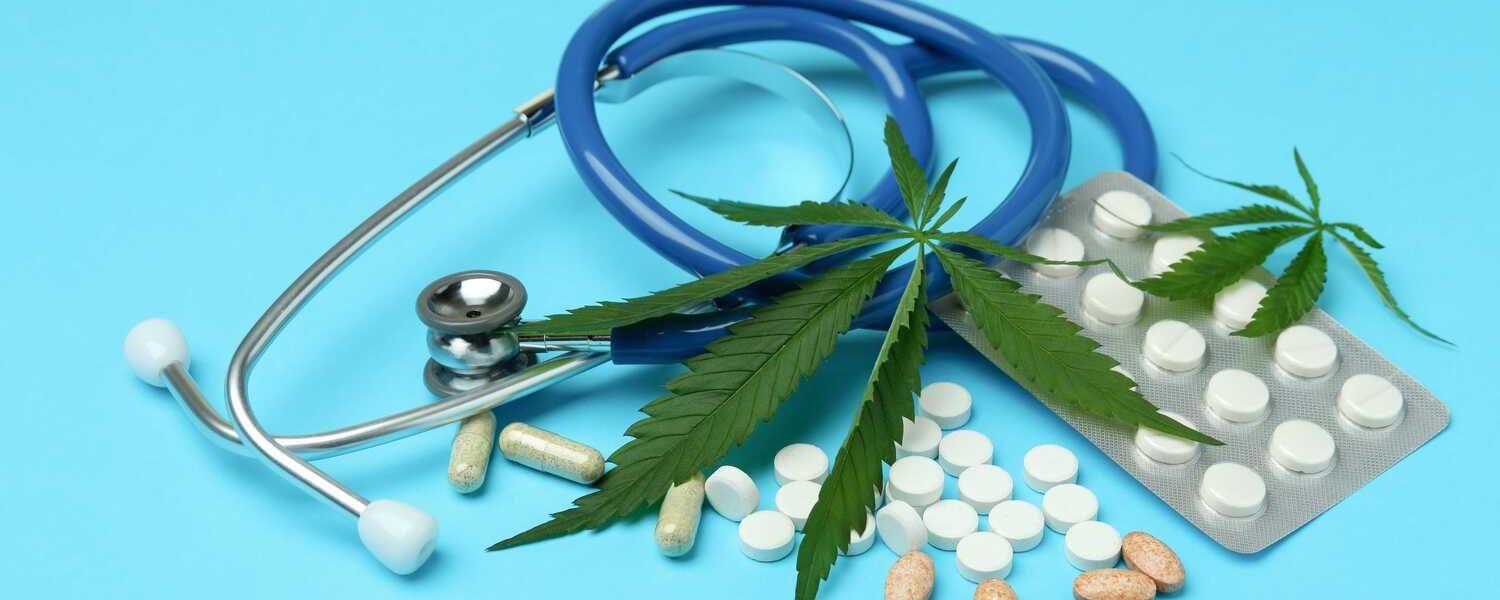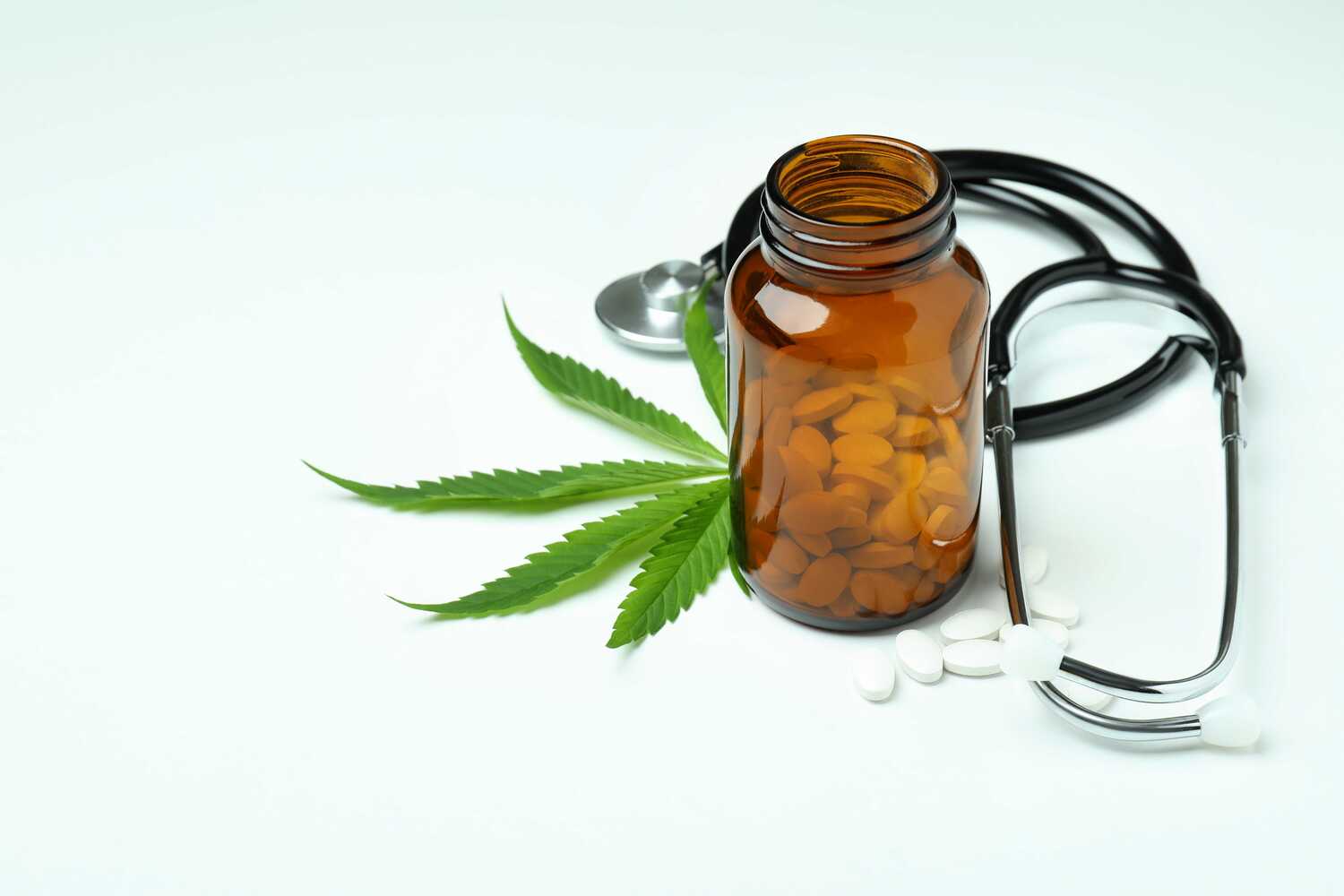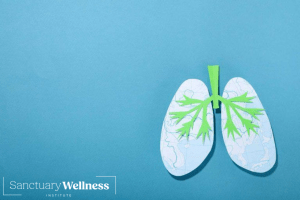Medical Marijuana vs. Prescription Drugs
- Jake Peter
- Published: May 4, 2024
- Fact-checked by Dr. Desiree Granados

In recent years, the debate between the use of medical marijuana and prescription drugs has intensified. This conversation is particularly relevant for patients and healthcare providers navigating treatment options for chronic pain, anxiety, epilepsy, and a number of other conditions traditionally managed by pharmaceuticals.
In this article, we’ll explore the advantages and drawbacks of using medical marijuana instead of prescription drugs to help you make more informed decisions about your medication regimen.
What Conditions Can Medical Marijuana Be Used to Treat?
Medical marijuana is prescribed for numerous medical conditions. Some of the most common ones include:
- Chronic Pain: Intractable pain is a leading reason for medical marijuana prescriptions, especially intractable pain caused by conditions like arthritis.
- Epilepsy: CBD has been found to be effective at reducing seizures in some patients, including those who have not responded well to other treatments.
- Multiple Sclerosis (MS): MS symptoms like muscle spasms and stiffness are known to be alleviated by medical marijuana.
- Glaucoma: Cannabis has been shown to lower intraocular pressure, providing temporary relief for individuals with glaucoma.
- Anxiety Disorders: For some patients, medical marijuana can reduce symptoms of anxiety, though it’s important to note that it can exacerbate feelings of anxiety or paranoia in others.
- Cancer-Related Symptoms: Medical marijuana can help address the nausea and loss of appetite induced by chemotherapy.
- Parkinson’s Disease: Some patients experience a reduction in tremors and muscle rigidity thanks to the use of medical marijuana.

Why Is Medical Marijuana Better Than Prescription Drugs?
Some of the advantages medical marijuana boasts over prescription drugs include:
- Fewer Side Effects: Cannabis tends to carry a lower risk of side effects than prescription drugs, and its side effects also tend to be milder.
- Versatility in Treatment: Cannabis can be used to treat a wide array of conditions, whereas most prescription drugs are limited in what they can treat.
- Lower Risk of Dependency: Studies suggest that the risk of dependency associated with medical marijuana is significantly lower than that of prescription opioids.
- Multiple Consumption Methods: Medical marijuana can be consumed in various forms—including bud, edibles, oils, and topicals—allowing patients to choose the method(s) that best suit their lifestyles and medical needs.
- Mental Health Benefits: Beyond its physiological benefits, medical marijuana has been proven to help with mental health issues such as anxiety and PTSD.
Is Medical Marijuana a Safer Alternative to Using Opioids?
Studies indicate that cannabis can provide the same relief as opioids without the unwanted side effects or as high a risk of dependency. However, it’s crucial to note that marijuana’s safety and efficacy are still being researched, and concerns about its long-term impact on mental health and cognitive function persist.
What Is the Most Effective Form of Medical Marijuana?
The effectiveness of medical marijuana largely depends on the condition(s) it’s being used to treat, the way it’s administered, and the user’s physiology. That said, while they aren’t strictly cannabis products, many find full-spectrum CBD products to be highly effective.
Full-spectrum products are believed to utilize the entourage effect, a theory suggesting that marijuana’s components work more efficiently together than in isolation. This form of CBD can provide significant relief for chronic pain, inflammation, and anxiety, among other conditions.
What Are the Risks and Side Effects of Medical Cannabis?
Despite the therapeutic benefits of medical cannabis, the drug carries risks and side effects that warrant consideration. These adverse effects can include:
- Cognitive Impairments: Short-term use can lead to memory issues, difficulty concentrating, and impaired judgment.
- Mental Health Concerns: Cannabis can exacerbate symptoms of anxiety, depression, and other psychiatric conditions. In some individuals, particularly those with a predisposition to mental health disorders, cannabis use can increase the risk of psychosis.
- Physical Effects: These can include dizziness, dry mouth, red eyes, and, if the marijuana is smoked, damage to lung health.
- Dependency Issues: Though it’s not as high as that of substances like opioids or alcohol, cannabis carries a risk of dependency.
- Drug Interactions: Cannabis can interact with other medications, potentially altering their effectiveness and/or leading to adverse effects.
Should I Use Medical Marijuana or Prescription Medication?
The answer as to whether you should use medical marijuana or prescription medication depends on the nature of your condition(s), your medical history, and your response to traditional medication(s). Though medical marijuana can alleviate symptoms without inducing the harsh side effects associated with conventional drugs, it’s not appropriate for everyone.
Be sure to consult your doctor before using cannabis or prescription drugs for any condition.
Conclusion
In summary, the choice between medical marijuana and prescription medication should be made based on your specific needs and your doctor’s directions. While medical marijuana presents a natural and versatile alternative to prescription drugs, it carries side effects and risks that must be taken into consideration. Your doctor can help you determine the best medication for you.
If you’re interested in using medical cannabis to treat a condition that has resisted conventional treatments, the Sanctuary Wellness Institute can help. Namely, we can connect you with a licensed medical marijuana doctor and guide you through the process of applying for a medical marijuana card in your home state. Book an appointment with the Sanctuary today to find out whether medical marijuana is right for you.
States Where We Offer Medical Marijuana Card Services
How we reviewed this article:
- Mayo Clinic (2021). Medical Marijuana
https://www.mayoclinic.org/healthy-lifestyle/consumer-health/in-depth/medical-marijuana/art-20137855 - Neurology Center for Epilepsy and Seizures (2024). CBD FOR SEIZURES- USE, EFFECTIVENESS, SIDE EFFECTS, AND MORE
https://www.neurocenternj.com/blog/cbd-for-seizures-use-effectiveness-side-effects-and-more/ - Susan A. Stoner (2017). Effects of Marijuana on Mental Health: Anxiety Disorders
https://adai.uw.edu/pubs/pdf/2017mjanxiety.pdf - Cory Gaiser (2021). Medical Marijuana Vs. Prescription Drugs. How Do They Differ?
https://newbodyaesthetics.com/medspa-blog/medical-marijuana-vs-prescription-drugs-how-do-they-differ - Stephanie Lake, M. Eugenia Socías, and M.J. Milloy (2020). Evidence shows that cannabis has fewer relative harms than opioids
https://www.ncbi.nlm.nih.gov/pmc/articles/PMC7030877/ - Sara Zaske (2018). Can marijuana ease mental health conditions?
https://www.apa.org/monitor/2018/12/marijuana - Amanda Reiman, Mark Welty, and Perry Solomon (2017). Cannabis as a Substitute for Opioid-Based Pain Medication: Patient Self-Report
https://www.ncbi.nlm.nih.gov/pmc/articles/PMC5569620/ - Kristina Iavarone (2023). Full-Spectrum CBD: What It Is, Benefits, and Products to Try
https://www.medicalnewstoday.com/articles/full-spectrum-cbd - Kim Painter and Stephanie Watson (2024). Medical Marijuana: Benefits and Side Effects
https://www.webmd.com/a-to-z-guides/medical-marijuana-faq#091e9c5e8140f487-2-6
Current Version
May 4, 2024
Written By
Jake Peter
Fact-checked By
Dr. Desiree Granados
Editorial Process
Our Editorial Process

Jake Peter received his journalism degree from Emerson College and has been writing content for the Sanctuary Wellness Institute since 2021. He is passionate about all things cannabis.







